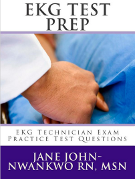The state Department of Health and Human Services has not yet established formal laws for EKG technician training and certification requirements in Nebraska. Medical facilities tend to categorize technicians as an unlicensed assistive personnel (UAP) who are subject to the rules and regulations for the delegation of nursing tasks to UAPs. While state agencies do not regulate technicians, many employers have developed their own education, training, and certification standards that must be met in order to be employed in the cardiac unit.
Delegation Regulations
The Nebraska Board of Nursing creates and enforces guidelines for the delegation of nursing tasks to unlicensed members of the patient care team. In the cardiovascular department, these tasks may include things like the administration of electrocardiograms, Holter monitoring, and telemetry. Regardless of the task being delegated, a nurse is usually required to retain accountability for the care that is provided to patients and any health outcomes that result from the decision to delegate to an unlicensed person. According to the Nebraska Nurse Practice Act, delegation means transferring to another individual the authority, responsibility, and accountability to perform nursing interventions. Section 38-2210 states that licensed nurses may use the services of individuals who are unlicensed to provide assistance with personal care and activities of daily living, but retain the accountability and responsibility to the consumer for the quality of nursing care rendered.
Education and Training Requirements
Because the state of Nebraska does not require the EKG technician to be licensed, competency standards are usually left to the employer to establish. The lack of formal government regulation means that technicians may encounter a variety of different expectations depending on the place of employment that they are considering. Although it is sometimes possible to enter the profession with nothing more than a high school diploma or GED, many employers have begun requiring unlicensed members of the medical staff to complete a minimum of a two year Associate’s Degree in a field that is somehow related to patient care.
Those who do not want to spend time completing a degree program may be able to bolster their resume by working in a less specialized area of patient care for a few years prior to transitioning to the cardiac care unit. A couple of the most popular options for individuals planning to take this route are that of the medical assistant and nursing aide. These two professions typically have less stringent entry requirements and offer many opportunities to acquire the basic knowledge and skills needed to manage patients in all areas of healthcare.
Aside from college education and patient care experience, employers typically require the EKG technician to successfully complete an in-house training program designed to orient an individual to the challenges of the cardiac care unit. These programs last anywhere from two weeks to a couple of months and may include both classroom instruction and formal clinical experience. Following the training period, an employer will likely require the completion of a nationally recognized certification exam that demonstrates competence in the field.
State Contact Information
Phone: (402) 471-3121
Toll-Free: (800) 254-4202
Email: DHHS.Helpline@nebraska.gov
 PO Box 95026 Lincoln, NE 68509
PO Box 95026 Lincoln, NE 68509
Phone: (402) 471-3121
Toll-Free: (800) 254-4202
Email: DHHS.Helpline@nebraska.gov
301 Centennial Mall South Lincoln, NE 68509





